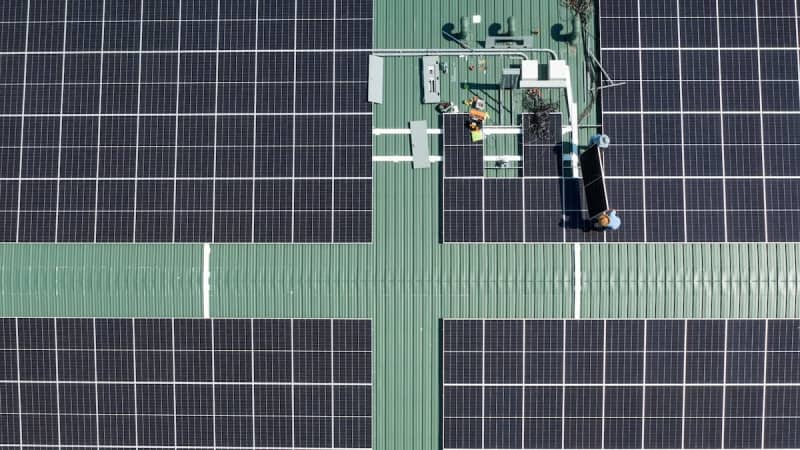Two energy companies are partnering up to bring solar panel recycling to Tampa Bay.
Facilities tied to GreenTech Renewables and Qcells in Tampa and Palmetto are the first to accept decommissioned or damaged solar panels from residential and commercial owners to be recycled. The purpose of the partnership is to recirculate parts of solar panels for future use.
Customers can either deliver panels to the warehouse or request they be picked up. GreenTech then ships them to a Qcells facility in White, Ga. The panels are stripped of glass and metals to be used for future use, said Hunter David, a sales representative for GreenTech in Tampa Bay.
“It’s really a natural partnership,” said Kelly Meger, senior director of sustainability for Qcells, an international company which manufactures photovoltaic cells, the piece of solar panels which converts sunlight directly into electricity. “(Electric vehicle) EV recycling is something that we’ve been really digging into.”
The Tampa and Palmetto warehouses are two of seven GreenTech locations accepting solar panels in Florida with others in Pensacola, Jacksonville, Miami, Orlando and Pompano Beach. GreenTech is a national solar distributor based in San Diego, Calif., with more than 100-plus locations across the country.
Solar energy has been criticized by supporters of fossil fuels for the waste associated with panels. According to the U.S. Environmental Protection Agency, one million tons of solid waste is expected to be attributed to solar energy by 2030. By 2050, that number is estimated to be 10 million tons.
Officials with both companies said they’ve had to dispel myths about the viability of recycling solar technology.
“We get to what’s called landfill parity,” Meger said. “The cost to recycle is equal or similar to the cost of landfilling.”
Glass is a large factor in the process.
“Not just any glass can become solar glass,” Meger said.
According to the U.S. Department of Energy, solar glass contains the photovoltaic cells Qcells creates, which absorbs, reflects and admits a portion of light. Electricity is produced and extracted after being exposed to a semiconductor. There are no solar glass manufacturers in the United States, which means recycling glass could bring lower prices for consumers.
When materials are recycled instead of going to a landfill, there can be up to a 20% reduction in emissions. There is a 30% reduction when considering glass, Meger said.
“We’re not having to use fossil fuels for machinery to dig up raw material from the Earth,” David said. “That’s going to slash lots of emissions itself.”
Florida ranks third in the nation for its solar energy, according to the Solar Energy Industries Association, a national lobbying group, with more than 20,000 megawatts of installed solar power and 14,108 related jobs. California and Texas were first and second, respectively.
When asked what is incentivizing customers to recycle panels, David said it’s largely customers who care about the environment.
“To a lot of people, that consciousness of knowing how it impacts the Earth is major.”

